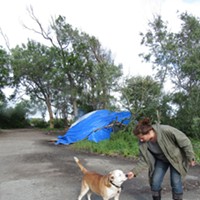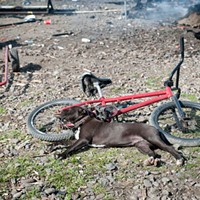"It's not a healthy place for people to be," says Erin Powers-Taylor, after receiving word that a man living in the PalCo Marsh has fallen ill, and that several wounds on his arms have abscessed again. Powers-Taylor has volunteered as part of the group Friends of the Marsh for almost a year, working with homeless people living behind the Bayshore Mall, occasionally fostering their dogs and always arriving to help serve a weekly lunch. To her, and many others, the May 2 eviction is bittersweet.
"It's a good and a sad moment at the same time," she says, adding that the conversation around finding a "safe and legal" place for people to go has evolved. "One year ago there was no discussion of treating people humanely. It was not on the table. And now, a lot of people back here have been housed."
One such person is Terrie Smith, who the Journal first interviewed in July of 2015. At that time Smith and her fiancé, Steve Tyson, had been given 10 days to vacate their marsh camp. Smith, who was dealing with health issues, said she was not strong enough to move. The notice went un-enforced; instead the city began a program of incremental enforcement and weekly service fairs. In the case of Smith and Tyson, the service fairs and the work of advocates such as Powers-Taylor garnered results. The extra time allowed the couple to purchase an RV, and the county's mobile outreach program assisted them in moving it to an RV park.
Smith says being housed "feels good." She now joins the Friends of the Marsh volunteers to serve food on Fridays. It's a way to give back, but also a way to reconnect with the community she left behind.
The afternoon before the evictions, a bright, warm Sunday, a woman named Karen, who declines to give her last name, mills about a camp in the northern stretch of the marsh, packing up. Karen is also newly housed, having moved into a rented room in a house on F Street five days earlier. Before that she'd lived in the Devil's Playground for about three years.
A former homeowner, Karen lost her home when her mortgage payments ballooned to $1,500 a month.
"I lost my dogs, my car, my house. Everything," she says. With nowhere else to go, she came down to the marsh. Things could be rough down there, she says. Violence was frequent, and thefts even more so, but there was also a community that looked out for its own.
"It's easy to judge from a distance, but there are some good people down here," she says.
It was ultimately a nasty infection on her arm that forced her out, Karen explains, pulling up her sleeve to reveal splotches of fresh, pink scars. It got so bad that she finally went out to the Street Outreach Services van to get some medical attention. There, she met Tom Nash, a county mental health clinician. Nash convinced her it was time to seek housing, and then tirelessly helped her search for an open room until they found one. It's nice having a safe place to go, Karen says, quickly adding that it's taking some getting used to. That's part of why she says she was happy to come back to the Devil's Playground one last time before the evictions to talk to some friends and pick up a few more of her things.
A few minutes after talking with the Journal, shouting comes from Karen's old camp. She and another woman are in an argument that ends abruptly when the woman shoves Karen to the ground. Karen gets up slowly and silently, trudges to another part of her camp and continues packing her things.
On the morning of the May 2 evictions, many people are still packing. Holley Stufflebean lived in the area, which she calls "the D.P.," for two years. She says that despite the violence and theft that occasionally come with life in the marsh, she appreciates the freedom and sense of community there. She adopted her dog Beethoven, a pitbull-St. Bernard mix, after his owner went to jail. Beethoven had lived in the marsh for 10 years and, despite being generally friendly, watching his owner being arrested had made him aggressive "around people in uniforms."
"I call him a D.P. O.G.," she says, adding that Beethoven roamed freely and she wouldn't want to confine him to the area where the new shipping container village was being set up. "I saw those metal boxes. It's a cold metal box. It's almost worse than jail."
Stufflebean says that she used to find consistent work with the fisheries or the bulb farm, but a crippling case of carpal tunnel made that impossible.
"I'm trying to get straight and get a job," she says, adding that most transitional living situations hold no appeal for her. "Clean and sober houses, they have rules and curfews. I'm 43 years old; if I want to be out all night I'll stay out all night."
Before becoming homeless, she was scared of the area. Then it became her home. It was a place where people take care of one another, but nobody talks about that, she says. When a man overdosed on heroin in the marsh, the media reported on the overdose, she says, but not on the friends that carried him to the parking lot and the waiting ambulance. Outside of the marsh, she says she is judged and "looked down on" by the rest of the town. Inside, she felt protected. By her friends. By her dog.
"The D.P. has a lot of lost souls; it's a place that absorbs lost souls. I used to never walk back there. The hair on the back of my neck would stand up," she says. "Now I feel like I could lay my head down on the ground there anywhere and fall asleep and be safe. We have our own little community."
On the morning of May 2, Stufflebean was still moving her belongings from her camp to the parking lot as the police looked on. She didn't know where she was going or which of her friends, if any, would be there when she arrived.
Editor's Note: This story was one in a four-article cover package. Read more at the links below.Eviction Day
Adequate Shelter?
Fuzzy Numbers














Comments